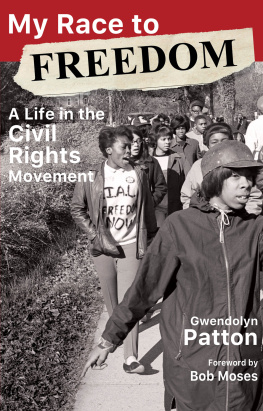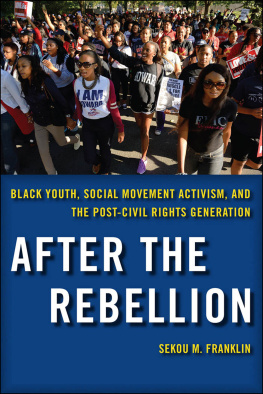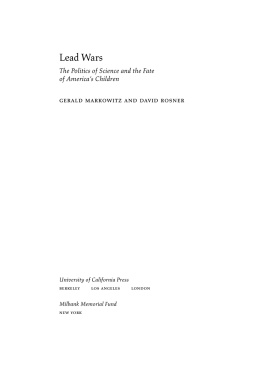
More Praise for CHILDREN, RACE, AND POWER:
An arresting study offers an intimate glimpse into contemporary struggles over race and power, and into the lives of the parents and children most impacted by these struggles.Kirkus Reviews
Both an intellectual portrait of two enormously important black social scientists and a broader history of race relations in Harlem, Children, Race, and Power captures the vitality and confusion of post-war progressive politics. If racism is Americas greatest flaw, then this absorbing study of the continuing struggle to protect the children who are its most vulnerable victims in the nations best-known black community is, in many ways, a history of the struggle for the American future.
Kenneth and Mamie Clark were among the most influential academic activists of the civil rights period. Perhaps best known as the authors of the pathbreaking research with black children that formed the basis for the Brown v. Board of Education decision, they were also the creators of the Northside Center for Child Development in Harlem. The center was, above all, an embrace of New York, and of the culturally vibrant, integrationist streak of African-American thought that flourished there in the early and middle twentieth century, but the Clarks work was continually stymied by an array of internal and external forces. Reading outward from these struggles, Markowitz and Rosner provide a perceptive, compassionate account of the Clarks half-century battle against racism and its legacy today.
Children, Race, and Powerwas awarded the Viseltear Award for outstanding work in the history of public health by the American Public Health Assocation.
A volume in the seriesCulture/Society/Politics:NewDirections in American History,edited by David Nasaw
An invaluable addition to the burgeoning literature on the significance of social science in American political culture since World War II, and particularly in the civil rights movement and Great Society.Dissent
At a time when arguments about genetically immutable inequality have once again become respectable, Children, Race, and Power brings to life the powerful work that Mamie and Kenneth Clark pioneered in identifying how children were affected by the poison of institutionalized racism. Ruth Messinger, former President, Office of the Borough of Manhattan
A thoughtful and timely book, which engages the reader in a reflection about why the visionary promise of U.S. race relations after World War II has evaporated Children, Race, and Power makes important contributions to the history of race relations.Reviews in American History
The Northside Center for Child Development was a dream that reached reality through the efforts of two great humanitarians, Kenneth and Mamie Clark.Charles B. Rangel, U.S. Representative, Congress of the United States
Mamie Phipps and Kenneth Clark are the kind of people who come to live among us and challenge some errors in our national determination to stimulate action for change.Ruby Dee
Children, Race, and Power
Kenneth and Mamie Clarks Northside Center
Gerald Markowitz and David Rosner
First published 2000 by
Routledge
Published 2013 by Routledge
2 Park Square, Milton Park, Abingdon, Oxon OX14 4RN
711 Third Avenue, New York, NY, 10017, USA
Routledge is an imprint of the Taylor & Francis Group, an informa business
Copyright 1996 by Gerald Markowitz and David Rosner
All rights reserved. No part of this book may be printed or reproduced or utilized in any form or by any electronic, mechanical or other means, now known or hereafter invented, including photocopying and recording, or in any information storage or retrieval system, without permission in writing from the publisher.
Library of Congress Cataloging-in-Publication Data
Markowitz, Gerald E.
Children, race, and power : Kenneth and Mamie Clarks Northside Center / c Gerald Markowitz and David Rosner.
p. cm.
Includes bibliographical references and index.
1. Northside Center for Child Development. 2. Social work with Afro-American childrenNew York (State)New YorkCase studies. 3. Social work with minoritiesNew York (State)New YorkCase studies. 4. Community mental health services for childrenNew York (State)New YorkCase studies. 5. Afro-American childrenServices forNew York (State)New YorkCase studies. 6. Harlem (New York, N.Y.)Social conditions. 7. Clark, Kenneth Bancroft, 1914 8. Clark, Mamie Phipps. I. Rosner, David, 1947 II. Title.
HV3185.N7 M37 2000
362.7'089'96073097471dc21
99-047634
ISBN 13: 978-0-415-92671-3 (pbk)
Contents
I n late fall 1989, as we were completing our last book, we received a call from George Smith, an old friend and president of the Winthrop Group, a historical research and consulting firm. George posed a simple question: did we know any historians who might be interested in writing a history of a small clinic in Harlem, the Northside Center for Child Development? We knew of the center and its founders, and we knew that this center was well-respected among those seriously involved in race, mental health, and urban politics in New York. In fact, we told George we might be interested in such a project ourselves.
In part, our knowledge of the center was rooted in our own backgrounds and interests. One of us had been a student of Kenneth B. Clark, a cofounder of the center, in a City College class on human motivation in 1965, a time of heightened optimism about the future of race relations and the possibilities for eliminating racial and economic inequalities. Aware that the Clarks famous doll studies had been crucial to the 1954 U.S. Supreme Court decision, Brown v. Board of Education, David had taken the course anticipating an examination of the inevitability of progress and racial equality. But Kenneth Clarks class was anything but sanguine. The reading list was loaded with memoirs of German concentration-camp survivors, philosophical and theological examinations of the predicament of the human condition, novels that explored human capacity to endure pain and suffering, and reports of psychological experiments showing peoples willingness to torture other humans when ordered to do so. Kenneth Clarks just-published and widely reviewed book, Dark Ghetto: Dilemmas of Social Power, was not on the list. Only Ralph Ellisons Invisible Man bore any apparent connection to civil rights or urban poverty. At the time, David considered this course a scholarly and academic exercise, unrelated to Kenneth Clarks broader involvement in the political and social movements shaking the country in the mid-1960s.
Thirty years later, it seems to us that Kenneth Clarks 1965 course on human motivation was much more than an academic exercise: it was profoundly concerned with the crisis of race and racism in mid-twentieth-century America. While writing this book, we learned that the optimism of white students at the time was fundamentally misplaced. It is clear now that Clarks doubt, and what had seemed to David almost melancholia, was rooted in his understanding of the broader cultures resistance to racial integration and to social, political, and economic equality. He could not share the optimism of his white students.








